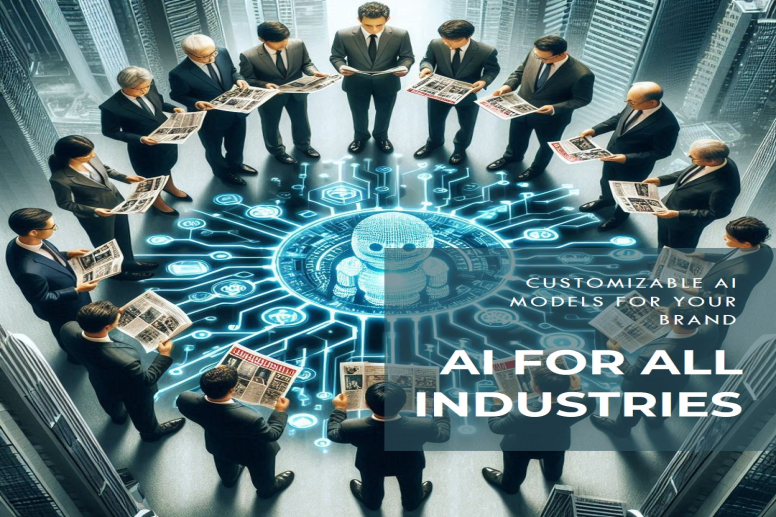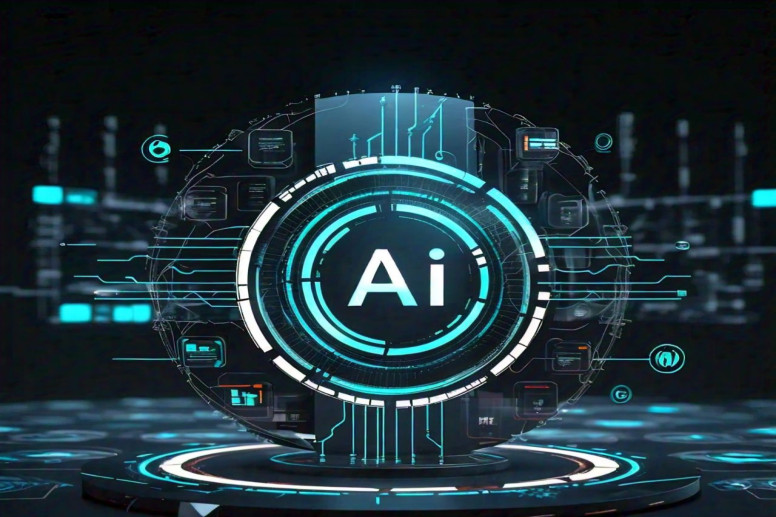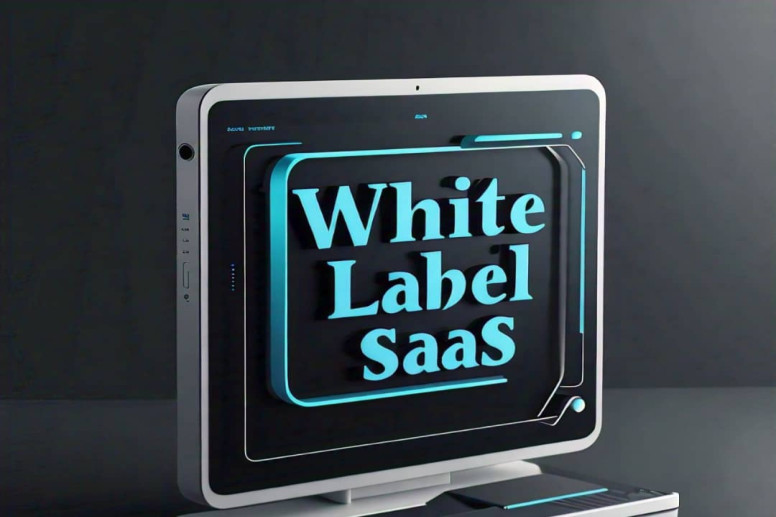
28 Oct
AI SaaS Revolution: Changing the Business Landscape.
Introduction:
The business landscape is undergoing a transformative shift, driven by the convergence of two powerful trends - the rise of Software-as-a-Service (SaaS) and the rapid advancements in Artificial Intelligence (AI). This AI SaaS revolution is reshaping how companies operate, communicate, and deliver value to their customers.
SaaS, with its on-demand, subscription-based mode and white-label-based model, has already disrupted traditional software delivery, enabling greater accessibility, scalability, and cost-efficiency. Now, the integration of AI capabilities into SaaS offerings is taking this revolution to the next level, unlocking unprecedented levels of automation, personalization, and intelligence.
See more info about white-label software
https://saasglobalhub.com/blog-details/white-label-saas-a-comprehensive-guide-for-businesses/33
In this article, we will analyze the concept of AI-powered SaaS, examine how it is transforming various aspects of the business landscape, and delve into the potential of AI as the next industrial revolution.
What is AI-based SaaS?
AI-based SaaS, or Artificial Intelligence Software-as-a-Service, refers to cloud-based software applications that leverage AI and machine learning technologies to enhance the user experience, automate processes, and generate actionable insights.
However, AI SaaS offers businesses easier access and scalability without significant upfront investment in infrastructure or specialized talent. At the core of AI-based SaaS is the integration of advanced algorithms, data analytics, and cognitive computing capabilities within the software platforms.
By integrating AI into SaaS (software as a service), businesses can utilize a wide range of benefits, including:
1. Intelligent Automation: AI-powered SaaS can automate repetitive tasks, streamline workflows, and enhance operational efficiency, freeing up employees to focus on more strategic and creative work.
2. Personalized User Experience: AI-based SaaS can tailor the user experience by understanding individual preferences, behaviours, and needs, and providing personalized recommendations, content, and support.
3. Predictive Analytics: AI-powered SaaS can analyze vast amounts of data, identify patterns and trends, and generate predictive insights to support data-driven decision-making.
4. Adaptive and Self-Learning Capabilities: AI-based SaaS applications can continuously learn and improve their performance by adapting to changes in user behaviour, market conditions, and other external factors.
5. Enhanced Collaboration and Communication: AI-powered SaaS can facilitate seamless collaboration, real-time communication, and knowledge sharing within and across organizations.
How AI Enhances the Future of SaaS
The integration of AI into the SaaS landscape is transforming the future of software delivery and business operations. Through automation, AI streamlines repetitive tasks, maximizing human resources for strategic initiatives.
Additionally, AI-powered predictive analytics empowers businesses to anticipate future trends, make data-driven decisions, and stay ahead of the competition. These advancements are driving innovation and shaping the future of SaaS, offering unprecedented value to both businesses and consumers.
Here are some of the key ways AI is enhancing the SaaS ecosystem:
1. Intelligent Assistance and Automation
AI-powered virtual assistants and chatbots are becoming an integral part of SaaS applications, providing real-time support, answering queries, and automating routine tasks. This intelligent assistance helps to facilitate user interactions, reduce response times, and improve overall customer satisfaction.
2. Predictive and Prescriptive Analytics
AI-based SaaS solutions can leverage advanced analytics and machine learning to uncover valuable insights from large and complex data sets. This allows businesses to make more informed, data-driven decisions, predict future trends, and prescribe optimal courses of action.
3. Personalized User Experiences
AI algorithms can analyze user behaviour, preferences, and contextual data to deliver personalized experiences within SaaS applications. This includes tailored recommendations, content, and functionality that cater to the unique needs of each user, enhancing engagement and productivity.
4. Adaptive and Self-Improving Capabilities
AI-powered SaaS applications can continuously learn and adapt to changing user needs, market conditions, and business requirements. By self-monitoring and self-correcting, these solutions can improve their performance and deliver greater value over time, reducing the need for manual updates and customization.
5. Enhanced Collaboration and Communication
AI-based SaaS tools can facilitate more effective collaboration and communication within and across organizations. Features like intelligent virtual assistants, real-time translation, and sentiment analysis can enhance team productivity, streamline decision-making, and foster stronger connections.
6. Intelligent Process Automation
AI can be leveraged to automate complex, rules-based business processes within SaaS applications, reducing the need for manual intervention and human error. This includes tasks such as invoice processing, contract management, and customer onboarding, leading to increased efficiency and cost savings.
7. Intelligent Customization and Deployment
AI-based SaaS platforms can leverage deep learning and natural language processing to automate the customization and deployment of software solutions for different industries and use cases. This allows for more rapid and tailored implementation, catering to the unique needs of each organization.
Is AI the Next Industrial Revolution?
The integration of AI into the SaaS ecosystem is not just a technological advancement – it has the potential to drive a transformative shift in the way businesses operate, akin to the transformative impact of previous industrial revolutions.
The first industrial revolution, marked by the advent of steam power and mechanization, revolutionized manufacturing and transportation. The second industrial revolution, characterized by the introduction of electricity and mass production, further enhanced industrial efficiency and output.
Now, the AI-powered SaaS revolution can be seen as the precursor to the fourth industrial revolution, where the fusion of digital technologies, automation, and intelligent systems is poised to transform every aspect of the business landscape.
Just as the previous industrial revolutions disrupted traditional industries and paved the way for new economic models, the AI-SaaS revolution is set to redefine how companies:
1. Operate and Manage Workflows
AI-powered SaaS applications can automate and optimize business processes, streamline decision-making, and enable more efficient resource allocation.
2. Engage with Customers
AI-based SaaS platforms can personalize the customer experience, anticipate needs, and provide intelligent, real-time support, fostering deeper, more meaningful relationships.
3. Innovate and Differentiate
By leveraging AI-driven insights, predictive analytics, and adaptive capabilities, SaaS solutions can enable businesses to innovate more rapidly, respond to market changes, and stay ahead of the competition.
4. Empower Employees
AI-powered SaaS tools can augment human capabilities, freeing employees from mundane tasks and enabling them to focus on higher-value, strategic work that drives business growth.
5. Optimize Supply Chains and Logistics
AI-based SaaS solutions can enhance supply chain visibility, optimize inventory management, and streamline logistics, leading to improved efficiency, cost savings, and greater responsiveness to changing demand.
Just as the previous industrial revolutions transformed the economic and social landscape, the AI-SaaS revolution has the potential to catalyze a seismic shift in the way businesses operate, compete, and create value. By harnessing the power of AI within SaaS platforms, companies can unlock unprecedented levels of agility, innovation, and competitive advantage.
How can businesses effectively implement AI solutions?
Implementing AI solutions presents emotional challenges like fear of change, uncertainty, and the need for extensive training. However, businesses can overcome these hurdles by fostering a culture of innovation, providing support and resources for upskilling and embracing the transformative power of AI to drive positive change and growth.
Effectively implementing AI solutions requires careful planning, strategic execution, and a deep understanding of the business's unique needs and goals.
1. Assessing Business Needs and Goals:
Before embarking on the AI implementation journey, businesses must clearly define their objectives and identify areas where AI can bring significant value. Conducting a thorough assessment of existing processes, pain points, and opportunities can help businesses pinpoint where AI solutions can drive the most impact.
2. Building a Robust Data Infrastructure:
Data lies at the heart of AI technology, powering algorithms and enabling machine learning models to make intelligent decisions. To harness the full potential of AI, businesses must establish a robust data infrastructure that ensures data quality, accessibility, and security.
3. Identifying Suitable AI Solutions:
The AI landscape is vast and diverse, offering a wide range of tools and technologies tailored to different business needs. Businesses must carefully evaluate and select AI solutions that align with their specific requirements and capabilities. Collaborating with AI experts can help businesses identify the most suitable solutions for their unique challenges.
4. Integrating AI into Existing Workflows:
Effective AI implementation involves the seamless integration of AI solutions into existing business processes and workflows. Businesses must ensure that AI technologies complement and enhance current operations rather than disrupt them. This may require redesigning workflows, retraining employees, and optimizing systems to accommodate AI-driven decision-making.
5. Investing in Talent and Skills Development:
AI implementation requires a multidisciplinary approach, combining technical expertise, domain knowledge, and data science skills. Businesses must invest in talent acquisition and skills development to build a capable AI team that can drive implementation and innovation. Additionally, providing training programs and upskilling opportunities for existing employees can foster a culture of AI proficiency within the organization.
6. Monitoring Performance and Iterating:
The journey towards AI implementation does not end with deployment. Businesses must continuously monitor the performance of AI solutions, gather feedback, and iterate on their implementations to enhance effectiveness and efficiency.
By tracking key performance metrics, analyzing outcomes, and refining AI algorithms based on real-world data, businesses can optimize their AI initiatives for long-term success. Embracing a culture of experimentation and agility can empower businesses to adapt to changing market dynamics and drive continuous improvement in AI implementation.
How AI Can Assist in Automating the Customization of SaaS Applications
One of the key challenges in the SaaS industry has been the ability to effectively customize and tailor software solutions to meet the unique needs of different industries and organizations. This often requires extensive manual effort, lengthy implementation timelines, and significant IT resources.
However, the integration of AI capabilities is poised to revolutionize the customization and deployment of SaaS applications, enabling a more automated and streamlined approach.
Here are some ways in which AI can assist in automating the customization of SaaS applications:
1. Natural Language Processing (NLP) for Requirements Gathering
AI-powered NLP can analyze natural language inputs from customers, such as requirements, use cases, and industry-specific workflows, and automatically translate them into technical specifications and implementation plans. This allows for more efficient and accurate requirements gathering, reducing the need for manual interpretation and translation.
2. Intelligent Data Mapping and Integration
AI algorithms can leverage machine learning to automatically map data structures, processes, and workflows between a SaaS application and a customer's existing systems and databases. This enables seamless integration and data synchronization, reducing the time and effort required for custom integrations.
3. Automated Configuration and Personalization
AI can analyze a customer's unique business processes, user roles, and preferences, and automatically configure the SaaS application's features, user interface, and workflows to align with their specific needs. This allows for rapid, personalized deployment without the need for extensive manual customization.
4. Predictive Customization
By analyzing historical data on successful SaaS deployments and customer feedback, AI-powered SaaS platforms can predict the optimal configurations, integrations, and customizations required for new customers based on their industry, size, and other relevant factors. This enables proactive, pre-emptive customization, reducing the time and resources required for the implementation process.
5. Self-Learning and Adaptive Customization
AI-based SaaS applications can continuously monitor customer usage patterns, feedback, and evolving business requirements, and automatically adapt and refine the customization over time. This self-learning capability ensures that the SaaS solution remains aligned with the customer's needs, reducing the need for manual maintenance and updates.
6. Automated Documentation and Knowledge Transfer
AI can generate comprehensive documentation, user guides, and training materials for the customized SaaS application, ensuring seamless knowledge transfer and user adoption. This includes the ability to dynamically update these resources as the customization evolves.
7. Intelligent Deployment and Rollout
AI can orchestrate the entire deployment and rollout process for the customized SaaS application, automating tasks such as server provisioning, software installation, data migration, and user onboarding. This streamlines the implementation and reduces the risk of errors or delays.
By leveraging these AI-powered capabilities, SaaS providers can significantly enhance the customization and deployment experience for their customers, delivering tailored solutions more quickly, cost-effectively, and with greater accuracy. This not only improves customer satisfaction but also enables SaaS vendors to scale their operations and reach a broader range of industries and use cases.
Ultimately, the AI-driven automation of SaaS customization represents a transformative shift in the software delivery landscape, empowering businesses to rapidly adopt and leverage cloud-based solutions that are optimized for their unique requirements.
Conclusion
The convergence of AI and SaaS is ushering in a new era of intelligent, adaptive, and personalized software solutions that are poised to redefine the business landscape. By integrating advanced AI capabilities into SaaS platforms, companies can unlock unprecedented levels of automation, predictive insights, and customization, driving greater efficiency, innovation, and competitive advantage.
As the AI-SaaS revolution continues to unfold, businesses must be prepared to embrace this transformation and leverage these powerful technologies to stay ahead of the curve. This will require a strategic mindset, a willingness to experiment and iterate, and a deep understanding of how AI can be applied to enhance various aspects of their operations.
The potential of the AI-SaaS revolution extends far beyond just improving individual business processes – it has the power to catalyze a fundamental shift in the way companies operate, compete, and create value. Just as the previous industrial revolutions reshaped entire industries and economic models, the AI-powered SaaS revolution is poised to usher in a new era of intelligent, adaptive, and interconnected business ecosystems.
For those who are ready to embrace this transformative change, the AI-SaaS revolution presents a unique opportunity to redefine their competitive landscape, deliver exceptional customer experiences, and drive sustainable growth in the years to come.

